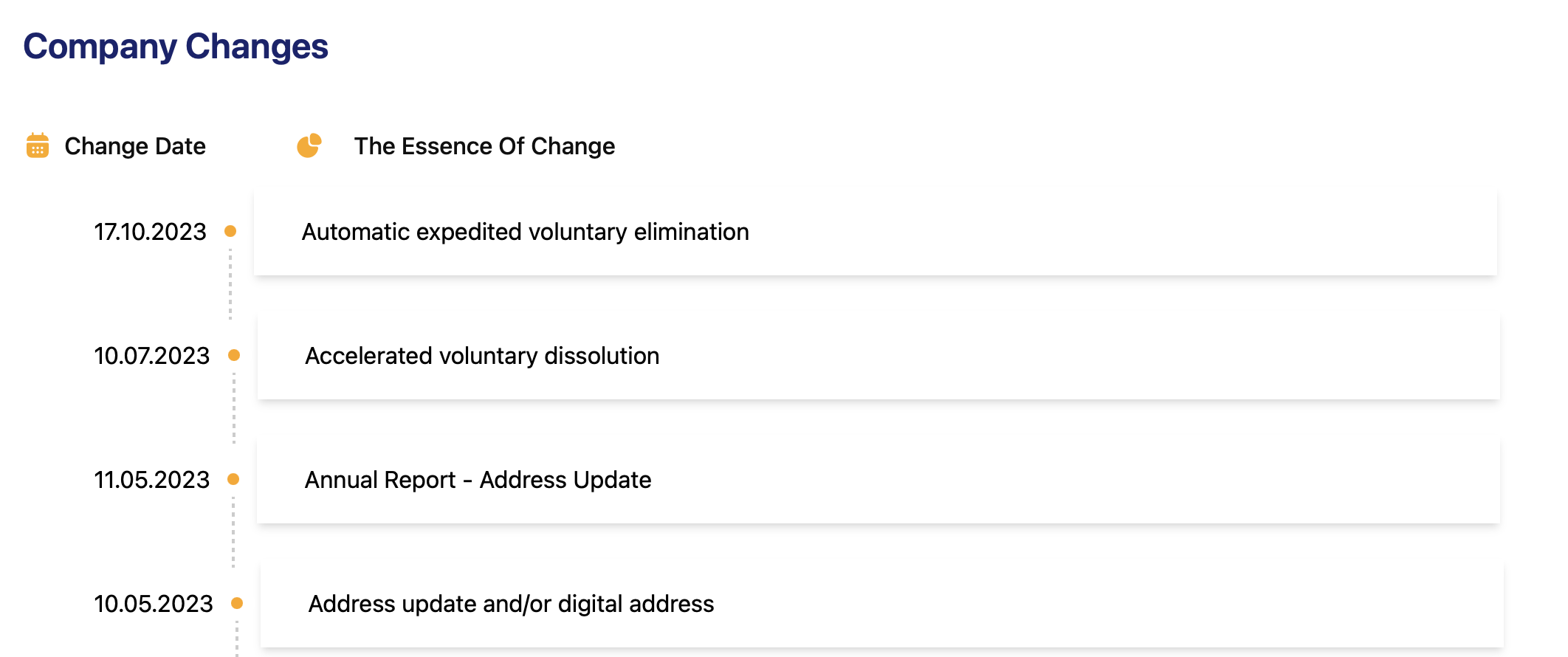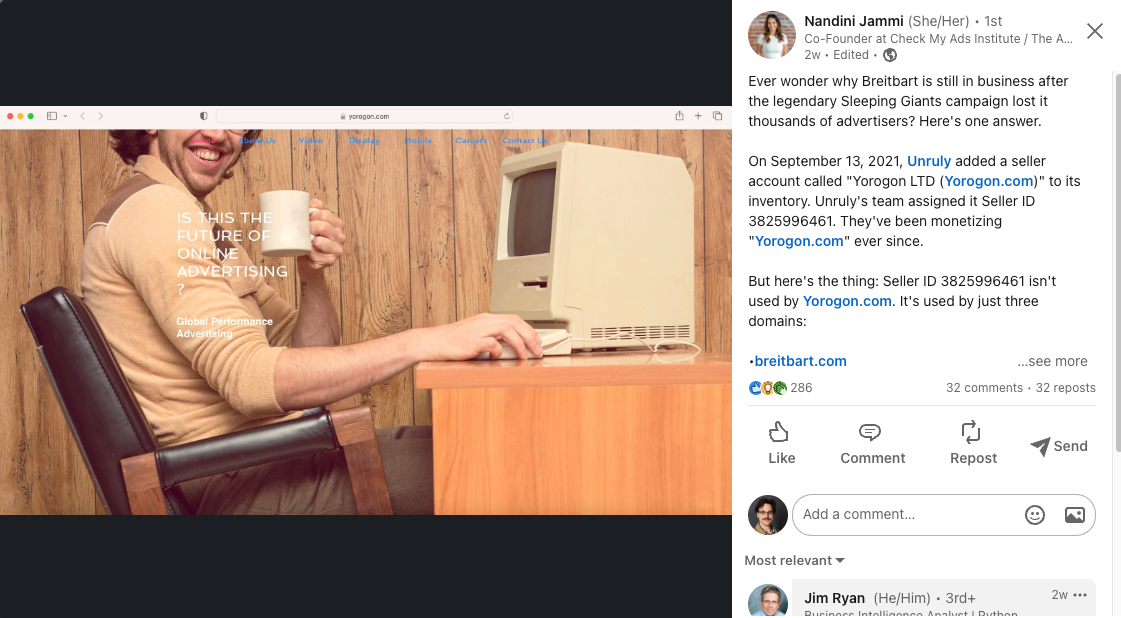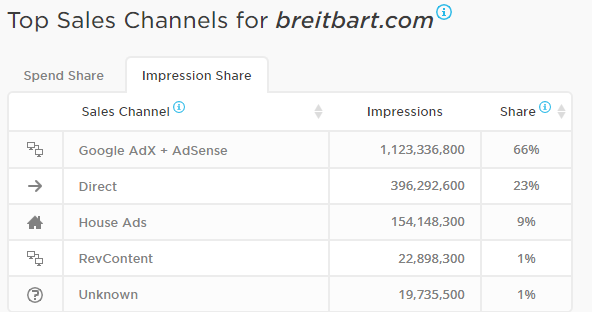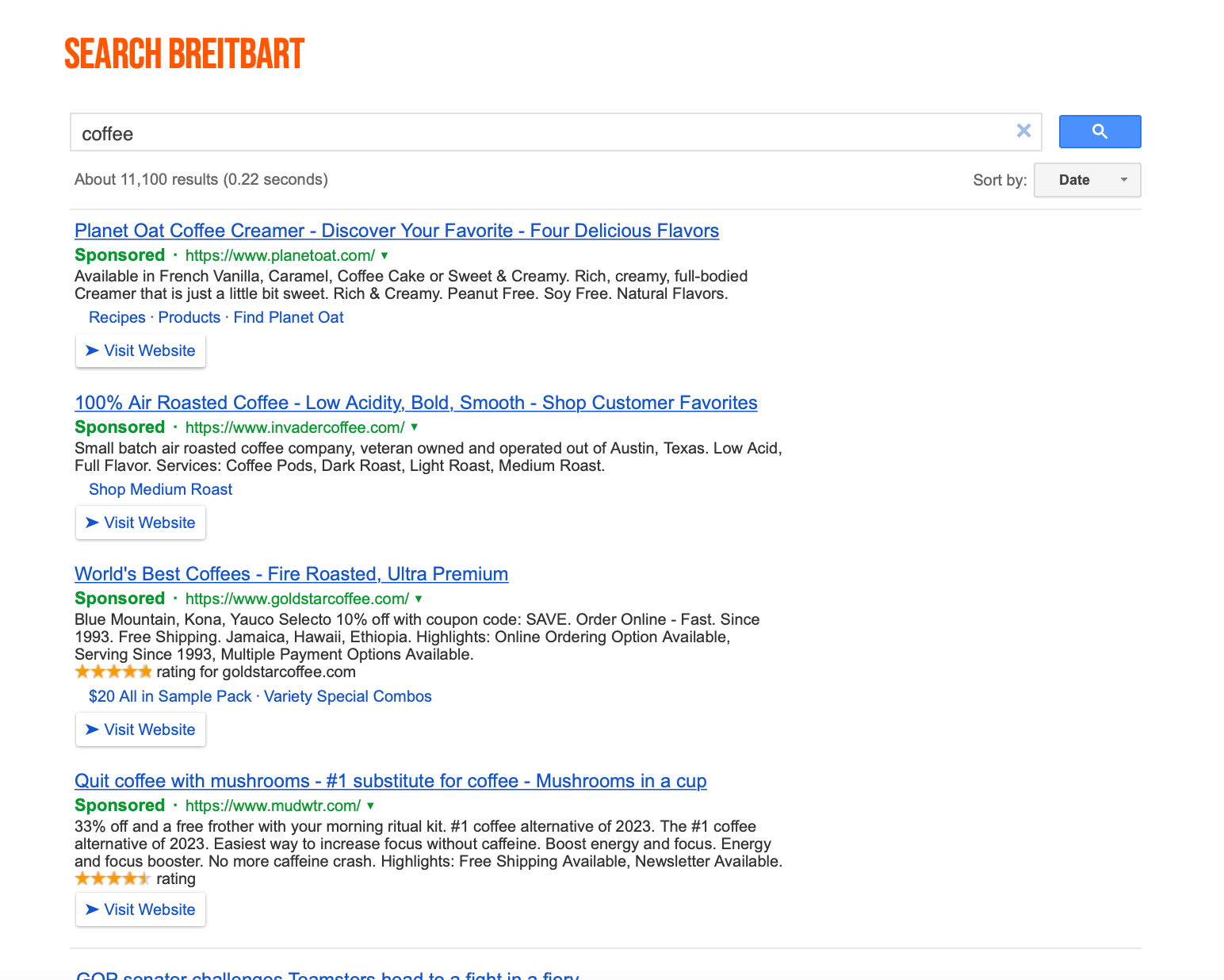Hey folks, Nandini here.
Seven years ago, Breitbart was at the height of its power and influence when a tiny social media account called Sleeping Giants pushed out its first tweet: “Did you know your ads are on Breitbart?”
The campaign ate their breakfast, lunch and dinner. Breitbart lost 90% of its revenue in 3 months — and the outlet is now nearly universally blocked by default across the ad industry.
Our campaign — which led thousands of advertisers to block the website from their media buys — should have should have effectively ended Breitbart’s ad business.
But as it turns out, it’s never that easy with the advertising supply chain. Breitbart has found new life beyond domain blocklists.
Over the last few weeks, I’ve been digging through the guts of Breitbart’s ad business to see how they’ve survived over the years.
And right off the bat, I’m delighted to share that four ad exchanges have dropped Breitbart from their inventories as a result: Consumable, Nexxen (formerly Unruly), Brightcom and OpenWeb have blocked Breitbart from their inventories.
Let’s look at how:
1. Breitbart is operating under an account called Voranda
In most cases, Breitbart can’t operate under its own name anymore. (Nobody wants them.) They’re getting around it by working with third party ad networks who help Breitbart back into the supply chain under other corporate names.
By using the ads.txt protocol, we have found Breitbart operating under the name Voranda. And it looks like Breitbart (or whoever is working on their behalf) is taking advantage of lax processes at the ad exchange level.
In October, Brightcom authorized an account called “Granite3” to sell ads on the domain “voranda.com.” In August of this year, the account was quietly changed to “Breitbart” and “Breitbart.com.”

The CEOs of Consumable and Brightcom were both unaware that Voranda was working with Breitbart and both removed the accounts promptly.
But what is Voranda and who is behind it? It looks like someone with a lot of experience being unwelcome in the ad industry. Voranda is operated by the former Digital Marketing Director of another widely blocked website: WND.com. WND was banned from Google Ads in August, 2022.
In our research, we found Voranda working with just three websites:
- Breitbart
- Drudge Report
- RefDesk.com
Voranda’s own website looks barely operational, which suggests to us that they already have the business they want.
In 2021, we first suggested that Breitbart had found a backdoor into the advertising supply chain called dark pools. It looks like we found one — and we’ll be reporting that story out for you soon. 🕵️♀️
2. Breitbart is also operating under a front called Yorogon Ltd.
Breitbart appears to have also monetized under a company called Yorogon Ltd.
Last month, I reported that Nexxen (formerly Unruly) has had an account called “Yorogon Ltd” in its inventory since September 2021.
The account was authorized to run ads on one domain: Yorogon.com. But there are only three domains using that seller ID (3825996461) — and Yorogon.com isn’t one of them. Instead, the sites are:
- breitbart.com
- api.breitbart.com
- wp.breitbart.com
What is Yorogon Ltd. anyway? The company is legally registered in Tel Aviv, Israel, and appears to have been founded as an ad network. But like Voranda, its website is broken and mostly abandoned. In fact, the website looks like someone made it as a joke or parody. It has no privacy policy, no contact info, no employees on LinkedIn.
We’ve reached out to Yorogon using the contact information we found with a CheckID business search tool: an email that appears linked to Israel-based entrepreneur Michal Bonjack. We also sent her a LinkedIn message.
Bonjack doesn’t list Yorogon on her LinkedIn. Instead, it says she’s currently working as the COO and co-founder of a company called 360 playvid.
Yorogon Ltd began the process of dissolution in mid-July, 2023.

Following our research, Nexxen removed Yorogon’s account from its inventory on Nov. 8, just over a week ago, after I first revealed this information in a LinkedIn post.
We haven’t received comment from either party. If that changes, we’ll let you know.

3. Google allows Breitbart to get around universal blocklists
Despite overwhelming pushback during the Sleeping Giants campaign, Google has held its line for years: If you don’t want your ads on Breitbart, block it yourself.
But actually, you can’t. Google lets websites evade advertiser blocklists using a product called Programmable Search Engine (formerly known as Google Custom Search Engine).
Programmable Search Engine allows sites to embed Google’s search function and capture ad revenue. Collectively, these websites are part of Google Search Network — a network of thousands of websites that advertisers are opted into by default for every paid search campaign.
Google bills advertisers for Search Network, but “doesn’t provide information detailing the website where your ad was shown on the Search Network.”
We have no way of knowing what percentage of advertiser budgets may be landing with Breitbart, but we do know that Google remains one of Breitbart’s significant sources of ad revenue.
This loophole is big, embarrassing, a huge brand liability … and also nothing new! We reported in 2020 that the Joe Biden campaign was monetizing Breitbart through this product.


This is why we won’t give you a domain blocklist
The most frequently asked question the Sleeping Giants campaign received was, “Do you have a domain blocklist?” The answer for us was an easy “no.”
We didn’t have the resources nor the desire to pull something like that together. Besides, you should not be obtaining advertising blocklists from random anons on the internet!
But in these seven years, I’ve learned that even if we had all the money in the world to develop a perfect and thorough blocklist, it wouldn’t even begin to solve our brand safety problem.
Breitbart has simply gone underground, digging deeper into the complex, esoteric maze of the adtech supply chain. They’re still accessing your ad dollars. It’s just harder for you to see it.
So no, there’s no domain blocklist coming up from Check My Ads. But we’ll do you one better: We will keep working to pull them out by the roots.
